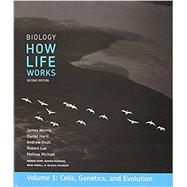
Note: Supplemental materials are not guaranteed with Rental or Used book purchases.
Purchase Benefits
What is included with this book?
James R. Morris is Associate Professor in the Biology Department at Brandeis University. He teaches a wide variety of courses for majors and non-majors in evolution, genetics, genomics, anatomy, and health sciences. In addition, he teaches a first-year seminar focusing on Darwin’s On the Origin of Species. He is the recipient of numerous teaching awards from Harvard and Brandeis. His research focuses on the rapidly growing field of epigenetics, making use of the fruit fly Drosophila melanogaster as a model organism. He currently pursues this research with undergraduates in order to give them the opportunity to do genuine, laboratory-based research early in their scientific careers. Dr. Morris received a Ph.D. in genetics from Harvard University and an M.D. from Harvard Medical School. In addition, he was a Junior Fellow in the Society of Fellows at Harvard University, gave talks to the public on current science at the Museum of Science in Boston, and works on promoting public understanding of personal genetics and genomics.
Daniel L. Hartl is the Higgins Professor of Biology in the Department of Organismic and Evolutionary Biology at Harvard University. He has taught highly popular courses in genetics and evolution at the introductory and advanced levels. His lab studies molecular evolutionary genetics and population genetics and genomics. Dr. Hartl is the recipient of the Samuel Weiner Outstanding Scholar Award and the Medal of the Stazione Zoologica Anton Dohm Naples. He is a member of the National Academy of Sciences and the American Academy of Arts and Sciences. He has served as President of the Genetics Society of America and President of the Society for Molecular Biology and Evolution. Dr. Hartl’s Ph.D. was awarded by the University of Wisconsin, and he did post-doctoral studies at the University of California, Berkeley. Prior to joining the Harvard faculty, he served on the faculties of the University of Minnesota, Purdue University, and Washington University Medical School. In addition to publishing more than 350 scientific articles, Dr. Hartl has authored or coauthored 30 books.
Andrew H. Knoll is the Fisher Professor of Natural History in the Department of Organismic and Evolutionary Biology at Harvard University. He is also Professor of Earth and Planetary Sciences. Dr. Knoll teaches introductory courses in both departments. His research focuses on the early evolution of life, Precambrian environmental history, and the interconnections between the two. He has also worked extensively on the early evolution of animals, mass extinction, and plant evolution. He currently serves on the science team for NASA’s mission to Mars. Dr. Knoll received the Phi Beta Kappa Book Award in Science for Life on a Young Planet. Other honors include the Paleontological Society Medal and Wollaston Medal of the Geological Society, London. He is a member of the National Academy of Sciences, the American Academy of Arts and Sciences, and the American Philosophical Society. He received his Ph.D from Harvard University and then taught at Oberlin College before returning to Harvard.
Robert A. Lue is Professor in the Department of Molecular and Cellular Biology and Director of Life Science Education at Harvard University. He regularly teaches in Harvard’s first-year Life Sciences program and upper-level courses in cell biology. He has a longstanding commitment to interdisciplinary teaching and research, and chaired the faculty committee that developed an integrated science course to serve multiple science majors and premedical students. Dr. Lue has also developed award-winning multimedia, including the animation “The Inner Life of the Cell.” He has coauthored undergraduate biology textbooks and chaired education conferences on college biology for the National Academies and the National Science Foundation, and diversity in science for the Howard Hughes Medical Institute and the National Institutes of Health. He also founded and directs a Harvard life sciences outreach program that serves over fifty high schools. He received his Ph.D. from Harvard University.
The New copy of this book will include any supplemental materials advertised. Please check the title of the book to determine if it should include any access cards, study guides, lab manuals, CDs, etc.
The Used, Rental and eBook copies of this book are not guaranteed to include any supplemental materials. Typically, only the book itself is included. This is true even if the title states it includes any access cards, study guides, lab manuals, CDs, etc.